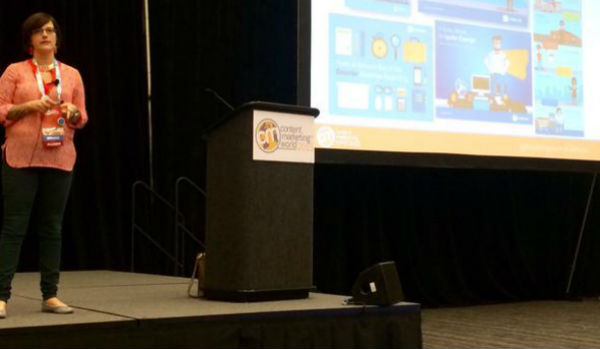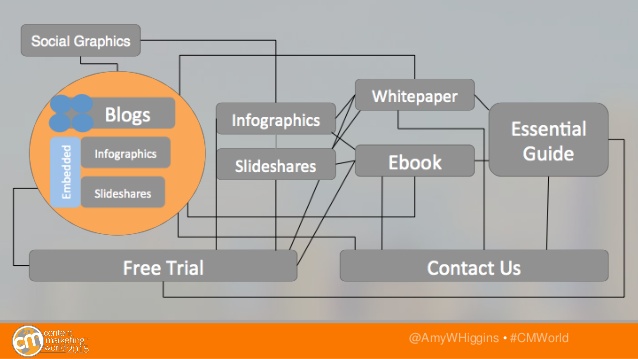 On the second day of Content Marketing World, it is apparent that one of the huge pain points of this industry is the struggle between quality and quantity of content. We all seem to feel the need to create more content and publish more often, in order to be seen. However, we also feel the squeeze of resource and time constraints.
On the second day of Content Marketing World, it is apparent that one of the huge pain points of this industry is the struggle between quality and quantity of content. We all seem to feel the need to create more content and publish more often, in order to be seen. However, we also feel the squeeze of resource and time constraints.
Given this struggle, it is no surprise, that the room is packed front to back for 101 Ways to Repurpose Content, a session from Amy Higgins, Senior Manager of Social Media for Zendesk.
Amy opens by assuring the room that with proper planning you can have it all, quantity and quality of content. She shares three primary ways to gain efficiency to ramp up volume and create better content.

#1 – Build Out Content: Start Big, Divide and Conquer
The best way to repurpose content is to start with a big content asset and then spin off smaller assets. Amy describes the big asset/smaller assets as a content galaxy. A content galaxy moves, evolves and interlinks, instead of forming a static hub and spoke.
The content galaxy includes:
- Sun: This is the large asset which the rest of the content will revolve around (like an Essential Guide or e-book)
- Planets: Mid-size, meaty assets which link back to the sun (like smaller Ebooks or Slideshares)
- Moons: These are the supporting items which revolve around the sun or planets (like Slideshare and infographics)
- Stars: The most numerous, small supporting items. These can be re-purposed nuggets of the moon, planets or stars (like Blogs, social posts and graphics)
Develop the Sun first and then spin off the supporting pieces to ensure all elements have a consistent voice and look and feel. The supporting pieces will link to each other, but all paths will lead back to the sun piece.
In the example Amy provides, one galaxy was broken down to over 500 pieces, filling the content funnel for over 18 months. The volume and lifecycle of the content will vary based on the size of the Sun piece.
#2 – Customize the Details for the Audience
Customization of content for a specific audience makes the content more likely to resonate and the viewer more likely to engage. Amy elaborates on two ways you can repurpose content for a specific audience.
Stage in the Buying Journey: Nurture paths can start with moons (light, top of funnel content) and then drive into the funnel with progressively deeper pieces, leading to the Sun asset, which is typically a bottom of funnel asset.
Industry: Determine top industries to target and create specific nuggets of content for each industry. If you have an infographic or e-book, just re-write one piece of it or call out so that it is customized with details for that vertical. It will make that industry feel more connected to the piece, but you won’t have to create a new asset for each vertical.
#3 – Revive and Redirect “Old” Content
Content is considered “old” when it is:
- Out of date – stats from 3 years ago, not quite syncing with your current brand voice, etc.
- Same same – the same thing you’ve written about 100 times
- Hard to find – buried deep on a third tier page or not linked to at all
Although it’s tempting to clean house when it comes to “old” content, according to Amy the best practice is to redirect rather than delete.
Old content can still have valuable equity within the search engines and was a big time investment. It saves time and equity to update the content rather than trash it.
How to Redirect and Refresh Old Content
- Turn it into something new – You can re-use that “5 Ways to …” outdated, boring white paper and turn it into an e-book. Adding graphics and jazzing up the bullet points will breathe new life into the content and you don’t have to recreate the wheel.
- Update the CTA – Refreshing your call to action is one of the easiest ways to revive an asset and make it more successful. Try AB testing new messaging for your CTA to determine if one out performs the other. Test a new offer to see if you get more bites.
- Review your linking strategy – Taking another look at how you are directing people to and from your content assets is a great way to refresh content and improve engagement rates. Look into your analytics and monitor bounce rates and navigation paths to determine if users are responding to links.
Creating content which is easily modular and refreshing old content pieces is a fantastic way to maximize your efforts and solve the problem of quality versus quantity of content.
Header Image via @SugarBrooke


